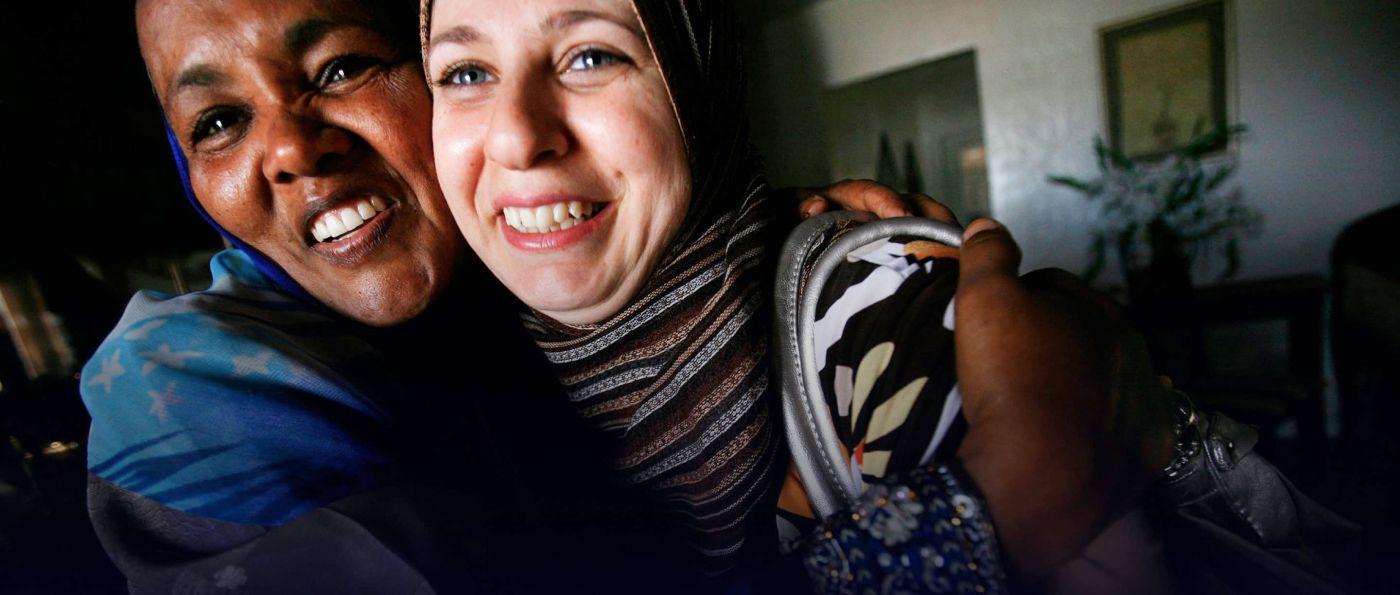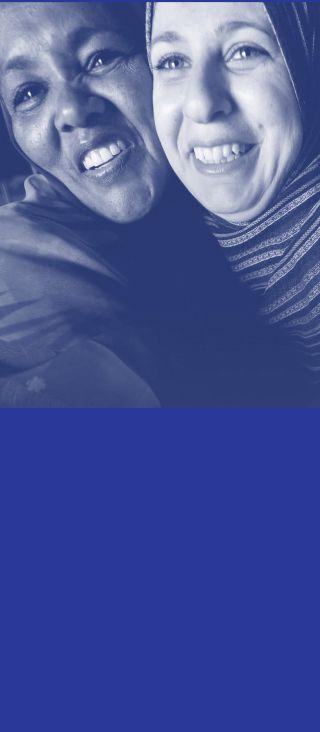

After years of separation, a family finds home and safety
From the gravity of feeling immensely powerless during the fall of Kabul, to the joy of a long anticipated reunification, the members of Team Fahimi were devoted to reuniting their coworker and friend with her family through the Welcome Corps program.
“I think the face that I remember most is Sediqa hugging her mom. It was wonderful. It was finally real,” shared Karen Lucas, a member of Team Fahimi and a former consultant with Welcome.US. “I just knew how long Sediqa had been waiting and how hard she had been working to reunite with her family. It was magical. It was so nice to be with her in that moment.”

That moment was four years in the making.
The oldest of six, Sediqa Fahimi and her siblings were raised in Afghanistan. The family belonged to the Hazara group, an ethnic and religious minority of the country. Her parents, Mohammad Yasin and Hajar Bibi, grew up together, married young, and worked the farmland in a rural region of Afghanistan. As their family grew, they committed to providing their six children with a happy and secure life through educational opportunities. After 25 years in rural Bamyan, they moved to Kabul in hopes of giving their children this future.
Sediqa studied for her master’s degree on a Fulbright Scholarship in the U.S., returning to Afghanistan in 2020 after she graduated. She took a job with the International Rescue Committee (IRC). Her sister, Mursal received a scholarship to attend DuPaul University in Chicago, and Zahra, the third oldest daughter, was attending a boarding school called the School of Leadership in Afghanistan.
Leading up to the fall of Kabul, Mohammad and Hajar became increasingly concerned about their children’s safety.
We risked our whole life to come to Kabul, to come to Mazar-i-Sharif for [our children’s] education. We were really worried that now that they're here, they might get killed.
They were especially worried about Sediqa who was working in a risky environment.
When Kabul fell to Taliban forces in August 2021, the IRC had over 1,000 local staff members working in Afghanistan. Sixty of those staff members were considered extremely high risk because of their ethnic background, gender, and other factors—Sediqa topped that list.
“Before Kabul fell, we never imagined the Taliban as a government,” said Sharif, the oldest son. “There were some places that the Taliban were, but we never imagined them being the main government of the country. It was so scary for us.”
Because of her priority evacuation status, Sediqa was able to flee with her younger sister, Mursal, but had to leave behind her parents and remaining three siblings. Zahra and her classmates at the boarding school were also evacuated from the country and sent first to Qatar, then to Rwanda, with Zahra eventually making it to the United States.
Evacuating was not easy. Images of people getting killed attempting to leave from the Kabul airport flooded the news. A gate was bombed, and there were warnings that the Taliban was setting up roadblocks surrounding the airport. All three daughters describe a harrowing journey, marked by terror, anguish, heartbreak and fear of what lay ahead.

“Out of the 60 that [the IRC] felt that we urgently needed to get out of the country, we were only able to get eight out,” shared Nazanin Ash, a member of Team Fahimi. Miraculously, 28-year-old Sediqa was one of those eight.
Sediqa’s parents, Mohammad and Hajar, and remaining siblings—Sharif, Murtaza, and Aylar—were not able to evacuate Afghanistan, and life was difficult for the family. In one encounter, Sharif was beaten so badly by members of the Taliban that his ear was severely damaged.
It was a dangerous place for us. We were all worried everyday [about] what the Taliban [will] do to us, and what will happen next.
After a year of living in fear, the members of the Fahimi family who remained in Afghanistan made a difficult escape to Pakistan. It was an expensive process, and passports were hard to obtain while the Taliban were in control. But through financial support from Sediqa, the family was eventually able to leave.
Life in Pakistan was not easy. The family struggled with the language barrier, they were unable to find work, and with visa renewal occurring every six months, they had fears of deportation back to Afghanistan.
They lived in uncertainty for two and half years, hoping they would be able to leave and reunite with their three daughters in the United States. Besides fear for their safety, Sediqa and her parents worried that Aylar, their youngest daughter–just 9 years old when they left Pakistan–and Murtaza, their youngest son, were unable to attend school.
Throughout this time, Sediqa took action. After her arrival at Fort Lee base in Virginia, she met Nazanin and other officials from the IRC. A few weeks later, Welcome.US was founded with Nazanin at the helm as CEO. Welcome.US launched after the fall of Kabul as a national initiative built to inspire, mobilize, and empower Americans to welcome and support people fleeing crises and seeking refuge in the United States.

“We launched Welcome.US on the 14th of September [2021]. Sediqa was my third call. She was employee number three,” Nazanin said. “She knew exactly what evacuees from Afghanistan were experiencing in the United States, and what they needed–because she was experiencing it too.”
Sediqa got to work focusing on programs for newcomers, but she never stopped fighting for her siblings and parents who were still in Pakistan. She pursued every path, filing countless applications, consulting immigration attorneys and engaging government officials in the U.S. and Canada.
Julia Imbriaco met Sediqa on her first day with Welcome.US and learned of Sediqa’s dream to reunite her family. The pair bonded quickly.
“As Sediqa was exploring ways to bring her family to safety anywhere, I was, of course, extremely invested in that effort,” Julia said. “I just knew that I wanted to be part of making an effort to reunite Sediqa with her family.”

In 2022, the U.S. government announced the launch of a new pathway for refugees under the U.S. Refugee Admissions Program (USRAP). The Welcome Corps program connected American private sponsor groups with refugees from all over the world.
It was initially introduced to match sponsor groups with refugees who were strangers to them, but in January 2024, the program was expanded to allow groups to sponsor refugees they knew, including friends and family who remained in danger.
This offered a beacon of hope for Sediqa.
Karen knew how incredible this opportunity was for Sediqa and her family. While their reunification had not been a possibility before, Karen knew it was time to come together and form a sponsor group to help the remaining Fahimi family come to the U.S.
Forming a private sponsor group required at least five individuals. Nazanin, Julia, and Karen were joined by their colleagues Rachel Quint, Krista Kartson, and Kari McDonough, forming the Team Fahimi sponsor group. They applied to sponsor the remaining Fahimi family members in January 2024.
After nine months of preparation, including finding housing and ensuring that everything was in place once the Fahimi family was authorized to travel, they got the long awaited news: The Fahimi family was authorized to travel and would be arriving on Sept. 30, 2024.


Waiting with welcome signs, balloons, and flowers at the airport, members of Team Fahimi welcomed Sediqa’s parents, brothers, and youngest sister to the U.S. Thousands of miles and many years had separated Sediqa from her family, and their reunion was an incredibly emotional experience.
“It's a good feeling... they are here. Life is so normal. The kids are going to school, they have homework. Mom is calling saying 'Let's go to get groceries',” Sediqa’s voice cracked and her eyes teared up as she continued, “That's home. It's nice."
With support from Welcome Corps partner Airbnb, the family had a comfortable place to stay during their first three nights in the U.S. Homes Not Borders, a Maryland-based nonprofit, helped furnish their new home with essential household items.
The Fahimi family has grown close with their sponsor group. With Nazanin’s younger children close to Aylar’s age, they have been playing and getting to know each other, celebrating their first American holidays–from Halloween to Thanksgiving to Christmas–together.

Hajar and her youngest daughter, Aylar.
As the family adjusts to their new home and country, they are happy with how much easier life is in comparison to their experiences in Afghanistan and Pakistan. They have found employment, their younger children are enjoying school, and the family is building connections in their new community.
Mohammad and Hajar always knew they wanted their children to have a strong education, “We believed that's the only way there are opportunities, [so] they can grow better.” With their children now enrolled in school in the U.S., those dreams are becoming reality.
It's really just added so much joy and fulfillment to now have these wonderful people in my life, but also to have been able to contribute to a friend's great joy in such a tangible way. It's opened my eyes to a new way to participate, and it's opened my eyes to a whole new way to help newcomers.
Sediqa continues to advocate for refugees and newcomers in her role at Welcome.US. She never gave up on the hope of having her family reunited in the U.S., and now that they have, she applies that same passion to her work for other individuals and families around the world.
More stories of welcome




